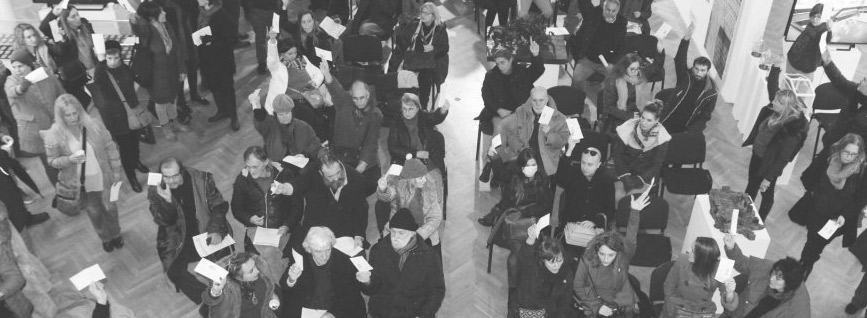Performing artistic activity in the existing socio-economic model is proving to be extremely unsustainable. The current conditions of artistic work and activity have been brought to the lowest rung of the ladder in the cultural production and financing chain. By reducing artistic production to project financing conditions in competition with state institutions, private and non-governmental sector in public competitions with competent republic, city or provincial institutions, artists are denied fair conditions for reaching budgetary funds, since the state allocates only 0.6% annually from its funds for culture.
According to this funding model the programs of public cultural institutions and the salaries of public sector employees favors them in the first place. It happens that those artists, which are primarily independent cultural workers and independent artists, on whose work and cultural production cultural institutions depend on, are completely neglected.
Since art is a form of cultural and social activity directly conditioning social development, it is necessary for the state to regulate relations in the cultural field and to enable the artistic production of independent cultural workers and independent artists to be supported systematically and structurally by public funds.
According to the existing Law on Culture, artists are treated as social cases where the local government pays minimal taxes and contributions and treats them as entrepreneurs in the culture, who need to fight for themselves in the market. In a society that does not have an artistic system, it has neither an audience nor an adequate platform for the development of cultural activity, an environment is created in which the participation of artists in dealing with problems of public interest is prevented and produces pressure that directs artistic production to act in the interest of capital.
At the beginning of 2020 a working group for FAIR ART PRACTICE was formed at ULUS. The focus of its work is on conceptualizing models for the systematic regulation of economic relations in the arts, according to fair exchange standards. The Codex of fair artistic practice, still under development, proposes equal project and structural funding by the state. By advocating recognition and valorization of artistic work, artists are encouraged to request a fair payment for their services in the art/creative sector as well as other facilities, necessary for the professional performance of their activities. The conception of this model draws on examples of fair practices in the arts that have been standardized in various countries in the region and in the rest of Europe.
The Codex of Fair Art Practice also relies on one of the basic goals of the Association, described in Article 6, Item 4 of the Statute, namely: affirmation of artistic activity, professional reputation of members and realization of economic valuation of their work. Developing the Association’s Codex of Professional Ethics, the Codex of Fair Art Practice advocates five core values that propose regulatory mechanisms for implementing legal acts and goals: solidarity, diversity, trust, sustainability and transparency. The Codex encourages the development of an ethically based and institutionally founded art labor market for all participants in cultural and artistic production.
